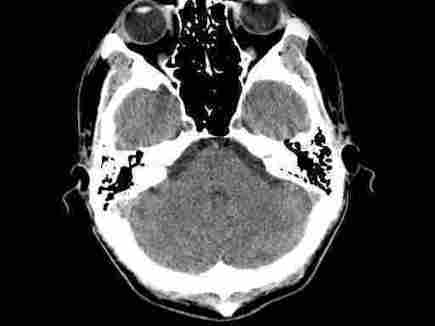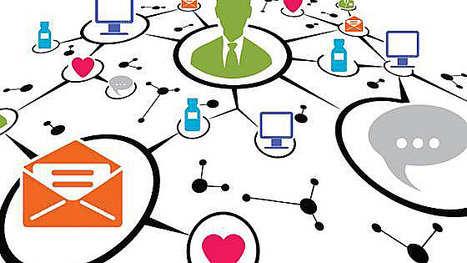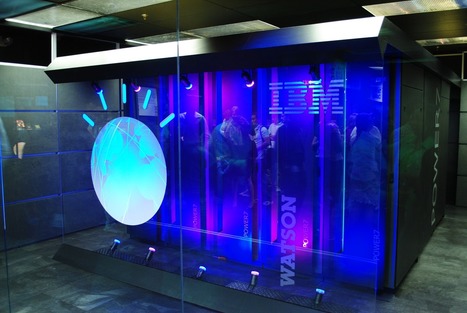 Your new post is loading...
 Your new post is loading...
Researchers investigating the benefits of 3D printing technology found it can deliver significant improvements to the running of hospitals. The research, which compared the drawbacks and advantages of using 3D printing technology in hospitals, has been published in the International Journal of Operations and Production Management. The study revealed that introducing such technology into hospitals could help alleviate many of the strains the UK healthcare system and healthcare systems worldwide face. Boosting surgery success rates - 3D printing makes it possible for surgical teams to print 3D models based on an individual patient’s surgical needs, providing more detailed and exact information for the surgeon to plan and practice the surgery, minimising the risk of error or unexpected complications. - the use of 3D printed anatomical models was useful when communicating the details of the surgery with the patient, helping to increase their confidence in the procedure. Speeding up patient recovery time - significant reduction in post-surgery complications, patient recovery times and the need for subsequent hospital appointments or treatments. Speeding up procedures - provide surgeons with custom-built tools for each procedure, with the findings revealing that surgeries with durations of four to eight hours were reduced by 1.5 to 2.5 hours when patient-specific instruments were used. - could also make surgeries less invasive (for example, removing less bone or tissue) - result in less associated risks for the patient (for example, by requiring less anaesthesia). Real-life training opportunities - enables trainee surgeons to familiarise themselves with the steps to take in complex surgeries by practicing their skills on examples that accurately replicate real patient problems, and with greater variety. Careful consideration required Despite the research showing strong and clear benefits of using 3D printing, Dr Chaudhuri and his fellow researchers urge careful consideration for the financial costs. 3D printing is a significant financial investment for hospitals to make. In order to determine whether such an investment is worthwhile, the researchers have also developed a framework to aid hospital decision-makers in determining the return on investment for their particular institution. read the study at https://www.researchgate.net/publication/344956611_Accepted_for_publication_in_International_Journal_of_Operations_and_Production_Management_Should_hospitals_invest_in_customised_on-demand_3D_printing_for_surgeries read more at https://www.healtheuropa.eu/3d-printing-technology-boosts-hospital-efficiency-and-eases-pressures/108544/
Lire l'article complet sur : www.healtheuropa.eu
Via nrip
Suki, the artificial intelligence (AI) voice assistant for healthcare professionals, launched in May to praise from health-tech innovators who hoped “Alexa for doctors” might slash electronic health record (EHR) documentation time.
If the company’s early numbers are any indication, that wish might come true.
Suki said recently that doctors who use the digital assistant have seen a 70 percent drop in time spent writing and filing medical notes. That figure is 10 percentage points better than the preliminary results of Suki’s pilot. The finding could prove powerful, as research has suggested that physicians burn almost two hours in the EHR for every hour of patient interaction. Suki has processed more than 12,000 patient encounters in the real world, handling 1,000 per week, according to the company. This steady stream of real-world data is poised to strengthen the technology’s machine-learning algorithm, which was trained on 250,000 patient encounters before it went live.
So far, Suki has integrated with three EHR systems. The company said that number is slated to rise.
Using voice commands, the technology pens a “clinically accurate” note that it then sends to a doctor’s EHR system.
Over the past several years, innovators across healthcare have advocated for a clinical voice assistant. But the challenges are many, from precise listening and documentation to satisfying cybersecurity concerns.
Although a clinical AI assistant might be far off for many providers and health systems, Suki and similar technologies could help solve a mounting problem in medicine: physician burnout.
Time spent in the EHR has been linked to physician burnout. On the conference circuit and in the opinion pages, doctor after doctor describes the stresses of medical note documentation — and how these demands eat up time and detract from care delivery.
Can Suki help improve workflows? It seems so. But can it go a step beyond and help physicians overcome burnout? Maybe. The answer to that question will depend on adoption rates and how Suki performs at scale.
Will Suki become a part of the clinic of tomorrow? Lets wait and see read the unedited story at https://www.hcanews.com/news/alexa-for-doctors-claims-70-percent-reduction-in-ehr-time
Via nrip
- The world's largest technology companies have all hired well-known cardiologists.
- Heart disease and high blood pressure affect a large number of people, are well-understood, and there's evidence that consumer products can help.
Big Silicon Valley companies have often competed for talent with specialized skills, like expertise in artificial intelligence or trendy new programming languages. Now they're competing for heart doctors. Apple, Alphabet, and Amazon have all hired well-known cardiologists. This might just be a coincidence. Cardiologists tend to be well educated and hard working, and big tech companies have a track record of recruiting such people. In recent years, all of these companies have started to invest in products and devices that are targeted to millions of people who could benefit by tracking their heart health. Apple's smartwatch now includes an electrocardiogram, which can detect heart rhythm irregularities. Verily's study watch, which is designed for clinical trial research, also tracks heart rate and heart rhythm, and it's doing a lot of work in chronic disease management. So the more likely explanation is that tech companies are interested in health care, and they have all come to the conclusion that cardiology should be an early (if not initial) target. Here's why. It's a huge potential market Heart disease is the No. 1 killer in the world, and strokes are among the leading causes of death. And that's not all that cardiologists treat. "Our scope covers other common disease such as high blood pressure, which impacts about a third of people in the U.S. — 75 million Americans — as well as lipid and cholesterol disorders," said Dr. Mo Elshazly, a cardiologist and assistant professor of medicine at Weill Cornell Medicine. Many cardiologists are also experts in nutrition and exercise science, which impacts a huge number of people who are committed to staying healthy. That's useful for the teams within the largest tech companies that are more focused on wellness and fitness applications, rather than on health and medical. Alphabet has Google Fit. Apple has a fitness group for its Apple Watch. And Amazon is looking at health and wellness applications for its Alexa voice assistant. It's well-studied Cardiology is among the most-studied fields in medicine, meaning there's already a lot of evidence to understand the root causes of heart disease, as well as how to prevent it. That's attractive for tech companies, which tend to base their development decisions on data. Their consumer products are already making a difference Let's take Apple, as an example. The company launched its first Apple Watch model with a heart rate sensor, never expecting that people would use it to discover they were pregnant, at risk for a heart attack or experiencing a dangerous irregular heart rhythm. But as people began sharing examples of how the Apple Watch saved their life, the company started to invest heavily in the science and technology to drive more of these stories. A lot of that work culminated in the first-ever clearance for a heart rhythm sensor called an ECG for Apple Watch earlier in the summer. read more at https://www.cnbc.com/2018/10/17/what-every-tech-company-needs-a-cardiologist.html
Via nrip
At the World Medical Innovation Forum this week, participants were polled with a loaded question: “Do you think healthcare will become better or worse from the use of AI?” Across the respondents, 98 percent said it would be either “Better” or “Much Better” and not a single one thought it would become “Much Worse.” This is an interesting statistic, and the results were not entirely surprising, especially given that artificial intelligence was the theme for the meeting. This continual stream of adoption of new technologies in both clinical and post clinical settings is remarkable. Today, healthcare is a technology operation. As a case in point, outside of the array of MDs and medical professionals presenting at the forum, there was clearly a strong, advanced technology thread weaved throughout the conversations of the traditional topics of pathology, radiology, bioinformatics, electronic medical records (EMR), and standard healthcare provider issues. As an example, a panel of senior technology experts from Microsoft, Cisco Systems, Dell EMC, Qualcomm, and Google joined research and information officers from Partners Healthcare and Massachusetts General Hospital to discuss the challenges in what they called “Data Engineering in Healthcare: Liberating Value.” That is a serious title for a panel. Data portability was clearly a key topic, as was security and the public cloud. The underlying issue with the cloud is that the EMR was never really designed to be portable. Health records existed with institutional walls, and were not originally intended for real time care, but more as a means of tracking costs and transactions as the patient traveled through the various systems. As the EMR has not only become more feature rich, the ability to mine that data inside of them with ML and AI methods is clearly at the forefront of everyone’s mind right now. There was discussion of episodic systems wrapped in policy and technology – this really isn’t quite how we can gain the maximum knowledge from the healthcare version of a Digital Me. A digital object containing all of our many and varied health related attributes. The challenges of discussing how to best build a “marketplace” and healthcare data exchanges and how to integrate “data marts” with existing EMR systems was obvious.
Via nrip
|
In its State of the Market 2018 report, HIMSS Analytics outlined nationwide adoption of major health IT trends. The report detailed market insights related to blockchain, cloud computing, EHRs, precision medicine and telehealth, among other health IT segments. Here are 5 highlights from the report: 1. Blockchain. The plurality of hospitals (45.3 percent) are still learning about blockchain and have not deployed any related programs. However, 55 percent said it is "somewhat likely" they complete a blockchain proof-of-concept or pilot in the next 24 months, followed by 17 percent of whom said it was "very likely." 2. Cloud. The majority of hospitals (65 percent) said they currently use the cloud or cloud services. Reasons for adopting cloud services included concerns with disaster recovery (37 percent), lack of internal IT expertise on site (25 percent) and IT maintenance costs (25 percent). 3. EHRs. EHRs have achieved almost universal hospital adoption; however, interoperability continues to present a core challenge. Only 2 percent of hospitals are on a single vendor at all affiliated practices, and nearly three-quarters of hospitals said they deal with more than 10 disparate outpatient vendors. 4. Precision medicine. Hospitals tended to cite lack of funding, technological or clinical expertise as barriers to adopting precision medicine, although nearly half of hospitals (45 percent) said they plan to expand their existing programs. 5. Telehealth. Telehealth adoption has reached 50 percent at U.S. hospitals. Moving forward, 55 percent of hospitals said they are "unsure" if they have plans to invest in telehealth services in the next 24 months, followed by 27 percent that said they do. more at https://www.beckershospitalreview.com/healthcare-information-technology/himss-analytics-the-state-of-blockchain-cloud-ehr-adoption-more.html
Via nrip
After 3 years as head of IBM’s health division, Deborah DiSanzo is leaving her role. A company spokesman said that DiSanzo will no longer lead IBM Watson Health, the Cambridge-based division that has pitched the company’s famed artificial intelligence capabilities as solutions for a myriad of health challenges, like treating cancer and analyzing medical images. Even as it has heavily advertised the potential of Watson Health, IBM has not met lofty expectations in some areas. Its flagship cancer software, which used artificial intelligence to recommend courses of treatment, has been ridiculed by some doctors inside and outside of the company. And it has struggled to integrate different technologies from other businesses it has acquired, laying off employees in the process. more at https://www.statnews.com/2018/10/19/head-of-ibm-watson-health-leaving-post/
Via nrip
Information technology has allowed much of our economy to automate processes. We have seen transformations of the airline, banking, brokerage, entertainment, lodging, music, printing, publishing, shipping and taxi industries through the availability of massive volumes of real-time price and service data. Across America, consumer-facing retail service continues to shift to a virtual environment. Healthcare is the exception. Many health information technology (health IT) products initially focused on billing. The misalignment between billing support and the sense that these tools do not materially automate clinician work to build in efficiencies or improve workflows adds to an overall frustration with the increasing amount of time providers spend at their screens. Automation is hard because it tends to require interfaces of various types – both to other machines (Internet of Things) and to humans. Often automation proposals involve solutions that focus on highly structured data. But, someone or something has to put energy (physician salary, for example) into organizing much of this information, assuming it is even knowable. The underlying disease or patient behavior (e.g., smoking) is also often not knowable. And, automation relying on machine to machine interfaces regularly runs into a lack of application programming interfaces (APIs) supporting complex clinical data flows. I posted this week old piece now and now when it was published as #NHITWeek is this week. A lot of posts this week deal with possibilities and problems with healthcare focussed automation. The original unedited piece can be read at https://www.himss.org/news/healthcare-automation-transforming-medicine
Via nrip
|



 Your new post is loading...
Your new post is loading...














